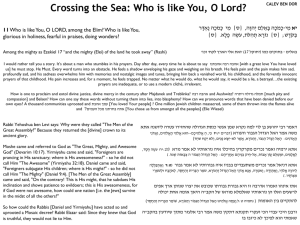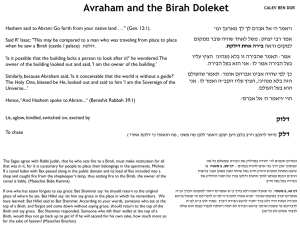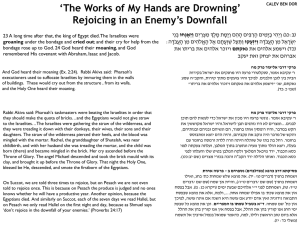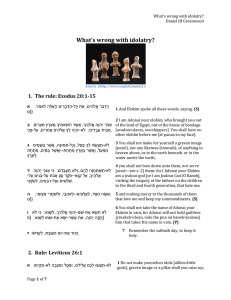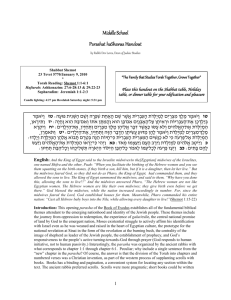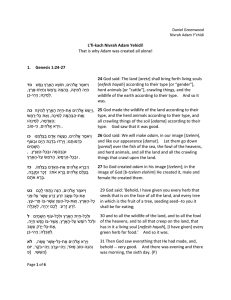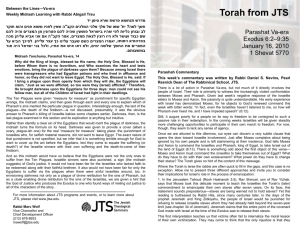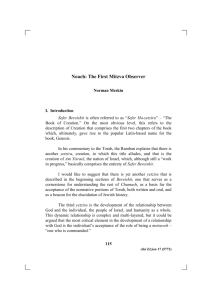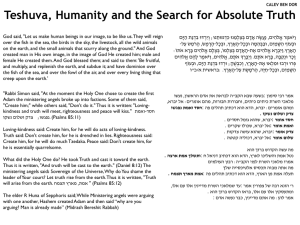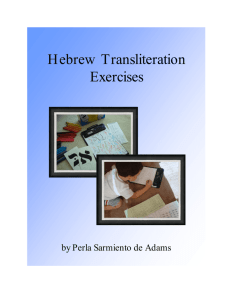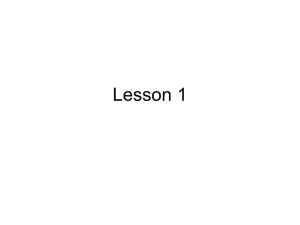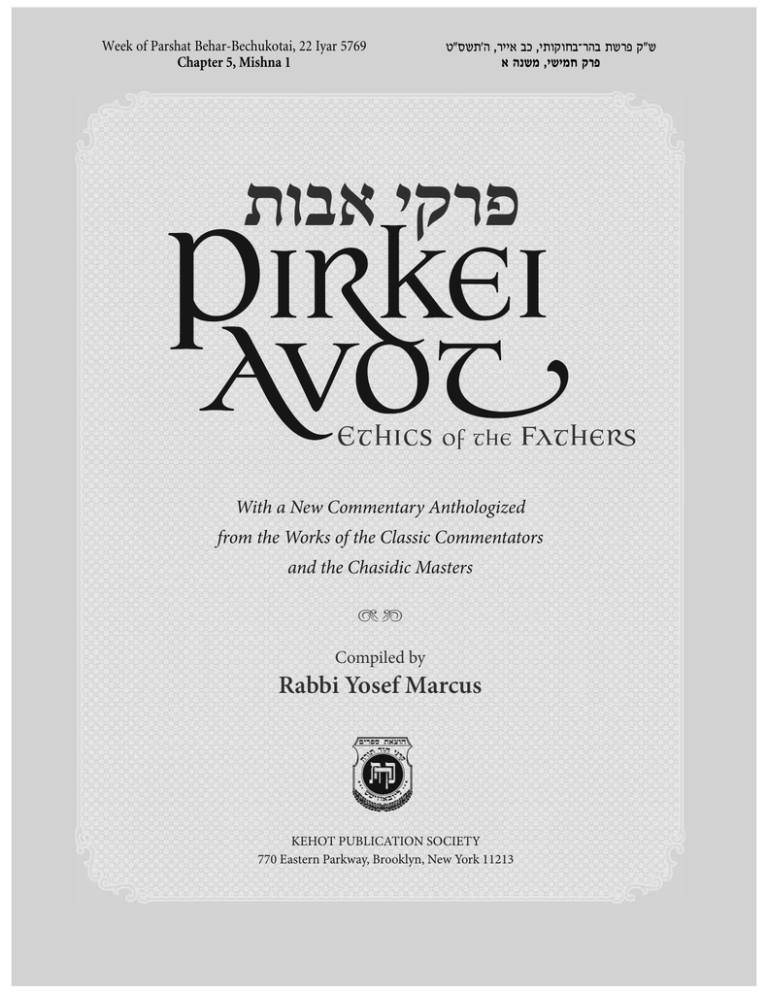
Week of Parshat Behar-Bechukotai, 22 Iyar 5769
Chapter 5, Mishna 1
yWxa,wv 'rhht cf 'h,ueujc-rvc ,arp eWa
t vban 'hahnj erp
פרקי אבות
With a New Commentary Anthologized
from the Works of the Classic Commentators
and the Chasidic Masters
Oo
Compiled by
Rabbi Yosef Marcus
KEHOT PUBLICATION SOCIETY
770 Eastern Parkway, Brooklyn, New York 11213
%THICSOFTHE&ATHERS
!LLOF)SRAELHAVEASHAREINTHE7ORLDTO#OMEASITSAYS(Isaiah 60:21)Your people are all righteous; they will inherit
the Land forever; they are the branch of My planting, the work of My hands in which I take pride. (Sanhedrin 11:1)
1 The WORLD WAS CREATED WITH TEN ;$IVINE= UTTERANCES 7HAT DOES
THIS COME TO TEACH US 3URELY IT COULD HAVE BEEN CREATED WITH ONE
UTTERANCE)TWASTOEXACTPAYMENTFROMTHEWICKEDWHODESTROYTHE
WORLD CREATED BY TEN UTTERANCES AND TO BESTOW AMPLE REWARD UPON
the righteous who sustain the world created by ten utterances.
MISHNAH 1
The bulk of the chapter five is arranged by teachings that relate to numbers—specifically the numbers
ten, seven, four, and three (Midrash Shmuel; see Magen
Avot).
The chapter begins with a sequential list of historic
events, all of which occurred in units of ten. Each event
leads naturally into the next:
1) The Divine utterances with which the world was
created, the last of which was the utterance that created
Adam; 2) the generations from Adam to Noah and 3)
Noah to Abraham; 4) Abraham’s trials, one of which was
when God told him about the Egyptian exile; 5) the Exodus from Egypt and 6) the splitting of the sea; 7) Israel’s
sojourn in the desert; and finally 8) the ten miracles in
the Holy Temple in Jerusalem.
The Mishnah then returns to the twilight of the sixth
day of creation, when ten supernatural phenomena were
created.
In each case the number ten is significant, as explained
below.
The Ten Commandments are not included in this list,
since the Torah precedes and completely transcends the
physical realm. Even the miracles described in the Mishnah relate ultimately to the physical. Similarly, even the
Holy Temple relates to the physical, since its purpose is
to house God’s presence in the physical world (see Likkutei Sichot, vol. 4, p. 1220).
ֲש ָרה מַ אֲ מָ רוֹ ת
ָׂ ּ ַבע4%. $)6).% 544%2!.#%3 The Ten
Utterances refer to God’s statements in the beginning
of Genesis, such as “God said, ‘Let there be light’,” “God
said, ‘Let there be a firmament’,” etc.
158
The commentators point out that the term “God said”
only occurs nine times in the narrative of Creation.
Whence, then, a tenth utterance?
Although not explicitly stated in Genesis, the events
described in the first verse of Genesis—“In the beginning of God’s creation of heaven and earth”—also
occurred through an utterance (Rambam), as in the
verse (Psalms 33:6), By the word of God were the heavens
made… (Bartenura).
The world came into being by the power of those utterances and remains in existence through the spiritual
power of the letters of the words of creation, as in the
verse (Psalms 119:89), Forever, O God, Your word stands
firmly in the heavens—i.e., the Divine energy embodied
in the words Let there be a firmament must remain within
the heavens to sustain their existence. Were that Divine
energy to depart from the heavens for even a moment,
the heavens would revert to nothingness as they were
prior to their creation.
The same is true of all of creation (see Shaar Hayichud
VehaEmunah).
ֲש ָרה
ָׂ ּ ַבע4%. Every being is made up of ten facets. The
number ten thus represents a complete unit (see above
on 3:6 and below). By creating the world with ten separate statements, instead of one general statement, God
granted meaning and significance to the individual features of reality. Consequently, one’s deeds—wicked or
righteous—become even more significant (see Rambam
and The Rebbe in Biurim).
By giving credence to the disparate aspects of creation,
God further concealed His being, which is epitomized
by oneness, thereby increasing the challenge faced by
human beings to act in a Godly way (see below).
ב-א:פרקי אבות ה
.ֲשה י ַָדי לְ ִה ְת ּ ָפ ֵאר
ֵׂ נֵצֶ ר מַ טָ עַ י מַ ע,יִיר ׁש ּו ָא ֶרץ
ְ לְ עוֹ לָם,יקים
ִ וְ עַ מֵ ְך ּכֻלָם צַ ִד:שנֶאֱ מַ ר
ֶ ׁ ,יִש ָר ֵאל י ֵׁש לָהֶ ם חֵ לֶק לְ עוֹ לָם הַ ּ ָבא
ׂ ְ ּ ָכל
הלֹא ְּבמַ אֲ מַ ר
ֲ ַו, ּומַ ה ּ ַתלְ מ ּוד לוֹ מַ ר,נִב ָרא הָ עוֹ לָם
ְ ֲש ָﬧה מַ אֲ מָ רוֹ ת
ָׂ א ּ ַבע
נִב ָרא
ְ ש
ֶ ׁ ש ְמ ַא ְּב ִדין ֶאת הָ עוֹ לָם
ֶ ׁ ש ִעים
ָ ׁ ֶאלָא לְ ִה ּ ָפ ַרע ִמן הָ ְר,ֶאחָ ד יָכוֹ ל לְ ִה ּ ָב ְראוֹ ת
נִב ָרא
ְ ש
ֶ ׁ יְמין ֶאת הָ עוֹ לָם
ִ ש ְמ ַק
ֶ ׁ יקים
ִ שכָ ר טוֹ ב לַצַ ִד
ׂ ָ וְ לִ ּ ֵתן,ֲש ָרה מַ אֲ מָ רוֹ ת
ָׂ ּ ַבע
.ֲש ָרה מַ אֲ מָ רוֹ ת
ָׂ ּ ַבע
ָּ ֶׁ
ָ ָ ְ
ִ ַּ ַ ְ ֶ ֶ
ּ ּ ַ ַ ֵ
ָ ַּ ַ ִ ֹ ְ ַ ֹ ַ ְ
ֶ ֶ ֵ ֲ
ִ ֵ ֶׁ ַ
וּמַ ה ּ ַתלְ מוּד לוֹ מַ ר7(!4 $/%3 4()3 #/-% 4/ 4%!#(
US. The Mishnah is asking two questions: (1) Why was
the world created with ten utterances? (2) For what purpose does the Torah let us know that the world was created with ten utterances? (see Midrash Shmuel)
ְּבמַ אֲ מַ ר ֶאחָ ד/.% 544%2!.#% A world created with
one utterance would have reflected the oneness and
unity of its Creator. Challenges and triumphs, failings
and rebirths would have been less likely in this more
spiritual world. God therefore created the world with ten
utterances, a very material world of division and multiplicity, in order to create an arena for human challenge
and achievement, reward and punishment (see Midrash
Shmuel and Arizal cited in Etz Chaim 11:6).
לְ ִה ּ ָפ ַרע4/%8!#40!9-%.4 The Mishnah does not say
“to punish” (l’ha’anish) but “to exact payment.” God punishes man—not for revenge, God forbid, but to set him
on the path of return, so that he repays what he owes and
redeems himself (see Midrash Shmuel).
v The commentators ask the obvious question: Would
God, who is the epitome of kindness, create the world
in a way that increases the punishment of the wicked?
Furthermore, why does the Mishnah list this as God’s
primary reason and the reward of the righteous as a secondary reason?
Through repentance one surpasses the level of a tzaddik who has never sinned. One who experiences spiritual
darkness returns to God with an intensity much greater
than that of the tzaddik. He thereby elevates the negative acts he committed, since they become fuel for his
return. The tzaddik, by contrast, serves God only within
the realm of the permitted.
Hence: God creates the world with ten utterances, a
world of disparity and challenge, to “exact payment from
the wicked,” i.e., for the return of those who have fallen,
ָ ָ ֵ
ִ ָ ּ
ֹ ֹ
ִ ִ ְ ַ ּ ָ
ֹ ֹ ַ
and secondarily, for the straightforward service of the
tzaddikim (see The Rebbe in Biurim).
ֲש ָרה מַ אֲ מָ רוֹ ת
ָׂ נִב ָרא ּ ַבע
ְ ש
ֶ ׁ יְמין ֶאת הָ עוֹ לָם
ִ ש ְמ ַק
ֶ ׁ יקים
ִ לַצַ ִד
4(% 2)'(4%/53 7(/ 3534!). 4(% 7/2,$ #2%
!4%$"94%.544%2!.#%3 Sfat Emet offers a homiletic
interpretation: The word for “sustain” (kiyum) in its legal
sense means “confirm,” such as confirming the validity
of a legal document.
Accordingly, the Mishnah is insinuating that through
their Godly ways the righteous confirm and testify that
the world was created by God and that it is sustained
through the energy of His ten utterances.
ַ ֹ
ַ ְ
ָ ָ ֵ
ֹ ֹ
ִ ָ ּ
ִ ִ ְ ַ ּ ָ
ּ ּ ַ ַ
ֵ
ֶ
ָ ָׂ ֲ
ָּ ֶׁ
ֹ ֹ ַ
ֶ ֵ ֲ
ִ ֵ ֶׁ
ַ
159
PIRKEI AVOT
Ethics of the fathers
Published and Copyrighted © 2009
by
KEHOT PUBLICATION SOCIETY
770 Eastern Parkway / Brooklyn, New York 11213
(718) 774-4000 / Fax (718) 774-2718
editor@kehot.com
Orders:
291 Kingston Avenue / Brooklyn, New York 11213
(718) 778-0226 / Fax (718) 778-4148
www.kehot.com
All rights reserved.
The Kehot logo is a trademark of Merkos L’Inyonei Chinuch, Inc.
Manufactured in the United States of America

